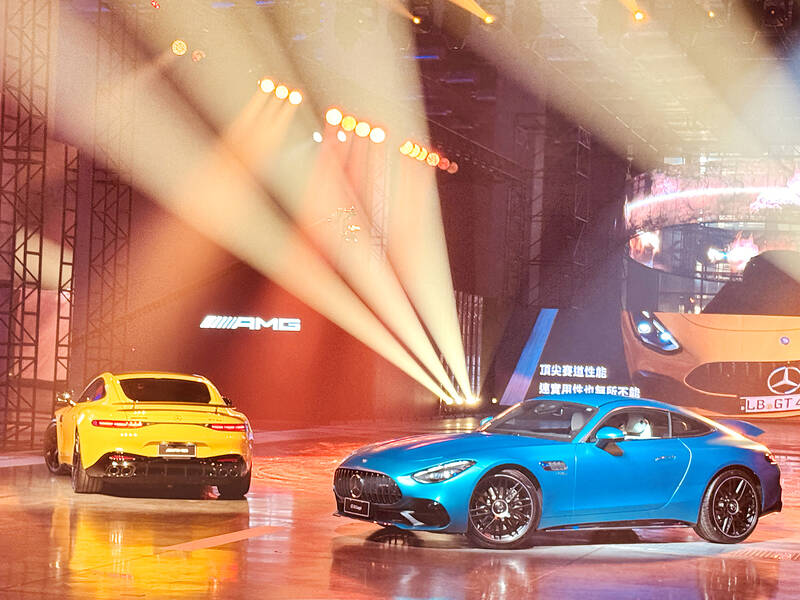New car sales in Taiwan last year fell 4 percent to the third-highest level on record as auto market consumption returned to normal following a sales boom in 2023, online market researcher U-Car.com said in a report yesterday, citing the latest government data.
The number of applications for vehicle license plates, an indicator of new car sales, slowed to 457,830 units last year, from 476,987 units a year earlier, the second-highest level since 2005, when 514,626 units were requested, the data compiled by the Ministry of Transportation and Communications showed.
The full-year results came as new car sales last month fell 4.3 percent year-on-year to 41,302 units. However, the figure rose 5.4 percent month-on-month, boosted by year-end promotion campaigns by automakers and dealers coupled with new arrivals of imported models, the data showed.

Photo: Amy Yang, Taipei Times
Sales of imported cars last year reached 220,503 units, an annual decrease of 1.8 percent, and a market share of 48.2 percent. The number of luxury imported cars increased 2.9 percent to 115,445 units, a market share of 25.2 percent, the data found.
Market leader Hotai Motor Co (和泰汽車), which distributes Toyota and Lexus vehicles in Taiwan, sold 12,637 units last month, bringing the company’s total sales for last year to 153,526 units, down 3.6 percent from the year before.
That still allowed Hotai to remain the No. 1 vendor in Taiwan for 23 consecutive years with a market share of 33.5 percent, the largest in 11 years, the company said.
In contrast, Yulon Nissan Motor Co (裕隆日產), which distributes Nissan and Infiniti vehicles, Honda Taiwan Co (台灣本田) and China Motor Corp (中華汽車), which makes its namesake brand as well as Mitsubishi and MG-branded vehicles, reported annual declines of 16.7 percent, 11.9 percent and 0.2 percent in sales to 19,842, 26,791 and 51,224 units in the year respectively, the data showed.
However, annual sales at Sanyang Industrial Co (三陽工業), which distributes Hyundai vehicles, rose 2.3 percent to 22,691 units, and Mazda Motor Taiwan’s (台灣馬自達) new car sales increased 7.1 percent to 14,776 units last year, the data showed.
Some popular imported brands, including Mercedes-Benz, BMW and Tesla, also fared better than expected with sales last year rising 7.6 percent, 14.7 percent and 16.1 percent year-on-year to 26,296, 20,332 and 15,276 units, respectively. However, Volvo sales declined 2.4 percent to 9,908 units and Audi delivered 3,945 cars, down 20.1 percent, the data showed.
For this month, total vehicle sales in Taiwan are forecast to reach 42,000 units, down 6.3 percent year-on-year due to fewer working days, despite promotions by automakers and dealers ahead of the Lunar New Year holiday, Hotai said.
Lunar New Year — the most important traditional holiday in Taiwan and also known as the Spring Festival — falls on Jan. 29 this year.

Vincent Wei led fellow Singaporean farmers around an empty Malaysian plot, laying out plans for a greenhouse and rows of leafy vegetables. What he pitched was not just space for crops, but a lifeline for growers struggling to make ends meet in a city-state with high prices and little vacant land. The future agriculture hub is part of a joint special economic zone launched last year by the two neighbors, expected to cost US$123 million and produce 10,000 tonnes of fresh produce annually. It is attracting Singaporean farmers with promises of cheaper land, labor and energy just over the border.

US actor Matthew McConaughey has filed recordings of his image and voice with US patent authorities to protect them from unauthorized usage by artificial intelligence (AI) platforms, a representative said earlier this week. Several video clips and audio recordings were registered by the commercial arm of the Just Keep Livin’ Foundation, a non-profit created by the Oscar-winning actor and his wife, Camila, according to the US Patent and Trademark Office database. Many artists are increasingly concerned about the uncontrolled use of their image via generative AI since the rollout of ChatGPT and other AI-powered tools. Several US states have adopted

A proposed billionaires’ tax in California has ignited a political uproar in Silicon Valley, with tech titans threatening to leave the state while California Governor Gavin Newsom of the Democratic Party maneuvers to defeat a levy that he fears would lead to an exodus of wealth. A technology mecca, California has more billionaires than any other US state — a few hundred, by some estimates. About half its personal income tax revenue, a financial backbone in the nearly US$350 billion budget, comes from the top 1 percent of earners. A large healthcare union is attempting to place a proposal before

KEEPING UP: The acquisition of a cleanroom in Taiwan would enable Micron to increase production in a market where demand continues to outpace supply, a Micron official said Micron Technology Inc has signed a letter of intent to buy a fabrication site in Taiwan from Powerchip Semiconductor Manufacturing Corp (力積電) for US$1.8 billion to expand its production of memory chips. Micron would take control of the P5 site in Miaoli County’s Tongluo Township (銅鑼) and plans to ramp up DRAM production in phases after the transaction closes in the second quarter, the company said in a statement on Saturday. The acquisition includes an existing 12 inch fab cleanroom of 27,871m2 and would further position Micron to address growing global demand for memory solutions, the company said. Micron expects the transaction to